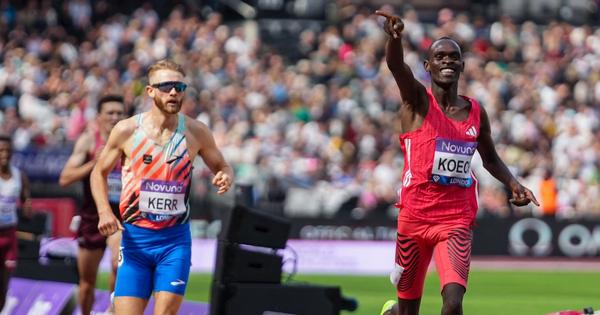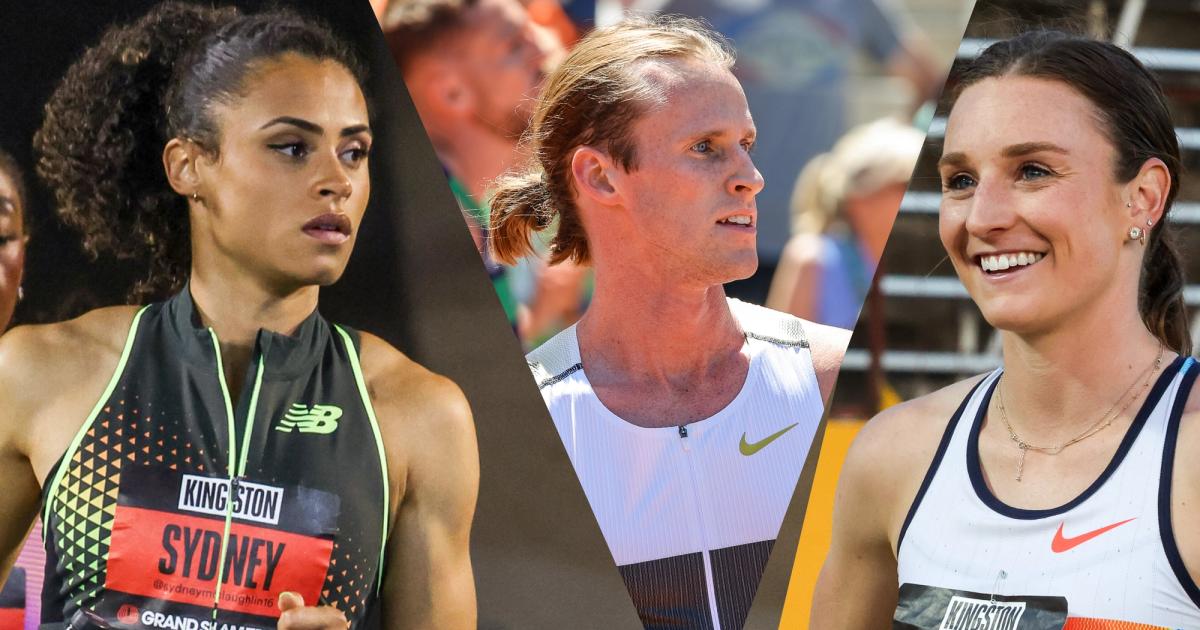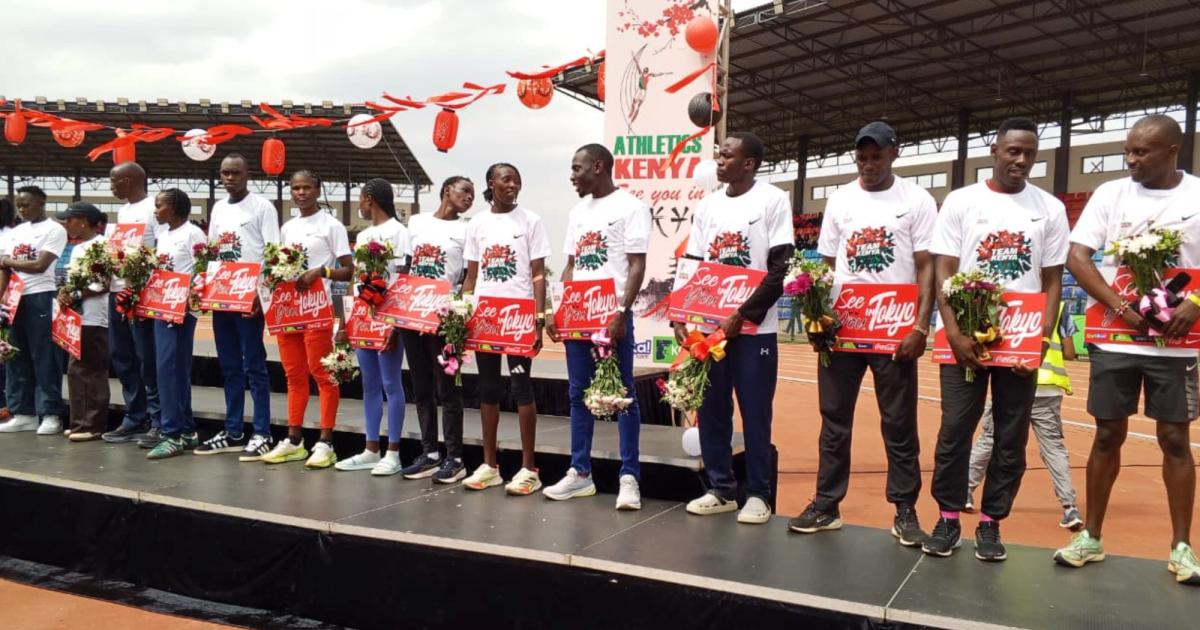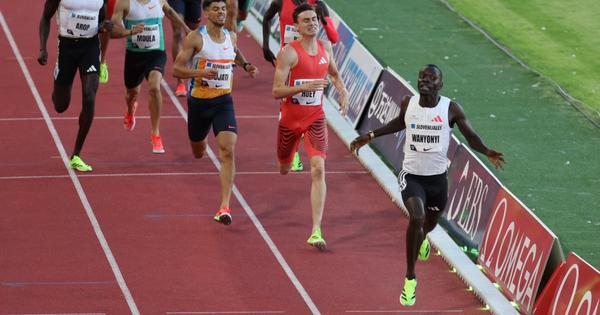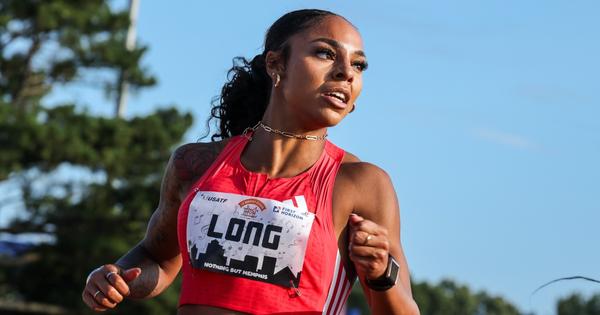By David Melly
July 23, 2025
It was the best of times; it was the worst of times. It was the age of fast sprints and the era of dramatic kicks. It was the start of the season for some and a midsummer turning point for others.
It was the last Diamond League for nearly a month, before everyone heads back home for their respective national championships. And the 60,000 or so largely local fans who packed London’s Olympic stadium had plenty to cheer for, with Georgia Hunter Bell (800m, 1:56.74), Charlie Dobson (400m, 44.14), and Morgan Lake (HJ, 1.96m) picking up big wins over stacked fields, alongside a world-leading 41.69 4x100m win over Jamaica in the pre-TV program.
At any Diamond League meet, there’s a big difference between finishing first and second—in prestige, in cash (a $4,000 difference, to be precise). But also for season trajectories and the narratives athletes will carry into the latter half of the season.
Women’s 200m: 1. Julien Alfred, 2. Dina Asher-Smith
Even after losing to Melissa Jefferson-Wooden in the 100m at Pre, Olympic champ Julien Alfred still has to be considered the favorite or at least co-favorite in that event in Tokyo. The 2024 World Indoor champ over 60 meters has always been considered better at the shorter sprints, despite her Olympic silver in the 200m in Paris. But Alfred and her coach Edrick Floreal have dedicated significant time to building up her strength and comfort over longer events, opening up the 2025 season with a couple of 300m and 400m races and not running a 100m until her seventh competition of the year.
It’s paying off: In London, Alfred decimated the field, notably opening up her biggest gap over the last 50 meters and crossing the line in a world-leading 21.71. That puts her in a three-way tie for #9 on the all-time list, just 0.11 behind Olympic champ Gabby Thomas’s lifetime best and 0.24 seconds ahead of the reigning Olympic champ’s fastest time this season. Whether or not you think Alfred is now the favorite in the 200m, if anyone is going to pull off the 100m/200m sweep this year, she’s got the best odds.
Alfred’s fellow Coach Flo disciple Dina Asher-Smith took second in 22.25, a season’s best in what’s already been a long haul for the Texas-based Brit. Asher-Smith has struggled in the past to stay healthy, but she’s up to 12 competitions (and 15 total races) already this year, a good sign of consistency even if the PBs haven’t quite come yet. Alfred may be the hot new name on the scene, but Asher-Smith has been around the block a fair few times even though she’s only 30 years old. (She’s been to three Olympics and has nine global medals, including a gold and silver in the 200m and 100m at 2019 Worlds.) If anyone knows how to peak at the right time, it’s her. Whether the 0.54 second gap between the two training partners closes by September will likely depend more on whether Alfred can sustain her blistering momentum—Asher-Smith is largely a known quantity who should continue to improve and sharpen her way into podium contention, but Alfred’s true ceiling is heretofore unknown.
Men’s 100m: 1. Oblique Seville, 2. Noah Lyles
Perhaps the biggest headline coming out of the UK would be the Olympic champion losing his first 100-meter race of the season. But there’s more to the story.
Eight days prior, Noah Lyles made his hotly-anticipated return to the 200m, where he defeated Olympic champ Letsile Tebogo head-to-head in Monaco with a 19.88 victory. Despite his largely quiet spring, Lyles didn’t show any sign of rust. In London, however, he was trounced by Oblique Seville, 9.86 to 10.00. Lyles got beat out of the blocks by at least half the field but was able to claw his way back to a second-place finish, thanks to his unmatchable top speed. Meanwhile Seville, the 24-year-old Jamaican, got away early and was never seriously challenged by the reigning World and Olympic champion.
For Lyles, this result was the definition of a mixed bag. It was actually 0.01 seconds faster than his first 100m of 2024… but that was in April, at a small meet in Florida. Not in July under the bright Diamond League lights. The 100m is a race where practice makes perfect, and given that Lyles is only one rep deep into the season, 10.00 is just the starting point. But 25 men have run faster this year, and Seville himself was handily beaten by Kishane Thompson at their national championships. Track and field’s occasionally dubious transitive property suggests Lyles clearly has some work to do to get ahead of the Paris silver medalist.
For Seville, this is a stellar follow-up to his runner-up finish in Kingston. He’s now got a 2-2 lifetime record against Lyles, and is the only man to defeat him in a 100m final since the end of 2023. But we already know that Seville can deliver in the middle of the season: he ran 9.82, 9.82, and 9.83 in June last year, but a podium finish at a championship has evaded him thus far. He was eighth in last year’s Olympic final and fourth at the last two Worlds, so while a big win here has to be a great confidence booster heading into the meat of the season, he’s ultimately gotta replicate this performance in Tokyo.
Men’s 1500m: 1. Phanuel Koech, 2. Josh Kerr
With Josh Kerr set to race in front of a favorable home crowd, expectations were high—Kerr even spoke pre-race about targeting his own British record of 3:27.79. He made his intentions clear during the race, too, sticking on the prescribed pace just behind fellow Brit George Mills once the rabbits stepped off. In the final lap, Kerr made a strong move around Mills with 250 meters remaining that would have likely been a fatal blow… had Phanuel Koech not made the same move at the same time on the inside, securing pole position.
Kerr was able to put two full seconds on the field (impacted by Mills getting tripped up and breaking his wrist in a fall) in the last 200 meters, but even that wasn’t enough to catch the Kenyan wunderkind, who claimed his first Diamond League victory in 3:28.82 in only the fourth 1500m of his short career. Two months ago, Koech had never raced a 1500m, and now he’s the world junior record holder with 3:27, 3:28, and 3:29 clockings on his card. It’s wildly premature to call the 18-year-old Koech the favorite for Worlds, particularly given that he’s never so much as raced a senior championship, and finished fifth in the 800m at World Juniors last year. But unless he can’t handle racing through the rounds, it’s looking more and more likely that he’ll be in the mix for the medals.
Kerr may have not gotten the victory or the record he wanted, but he still went home with a season’s best 3:29.37. Koech looks like the man of the moment in the 1500m, but Kerr is a paragon of consistency. He’s broken 3:30 in four of the last five seasons now, and he and Jakob Ingebrigtsen are the only two men to make every championship final going back to 2019. Koech is an even bigger wild card than either Alfred or Seville, but it’s clear the talent is there—the question now is whether he’s able to sustain his ascent, or even plateau respectably into September.
Women’s mile: 1. Gudaf Tsegay, 2. Jessica Hull
The women’s mile results presented an interesting contrast as well, but this event didn’t come down to a battle between an experienced veteran and a promising newcomer. Both Gudaf Tsegay and Jessica Hull have been laying high-quality brick after brick on the international circuit for years now, and while both came away with the fastest mile time of their careers, it’s hard to be considered up-and-coming when you’ve already arrived.
Tsegay is maybe the best runner in the world to not be the best runner in any event. She has nine global medals (five outdoor, two indoor), including two World golds—the 5000m in 2022 and the 10,000m in 2023. She’s #3 all-time in the 1500m (3:50.30), #2 all-time in the 5000m (14:00.21), and #3 all-time in the 10,000m (29:05.92). She just happens to have the great misfortune of entering her prime at the same time as Faith Kipyegon, Sifan Hassan, and now Beatrice Chebet.
With her daring run in London, where she passed the pacer in the first lap en route to a 59.9 400m split, Tsegay is now also the second-fastest woman all-time over one mile (4:11.88). Tsegay’s career almost has a tragic nature to it—she’s able to put up extraordinary performances left and right but never quite receives the shine of her rivals.
Hull, on the other hand, is rarely considered a true world-beater, but has made quite the career out of chasing the record-setters. Her run in London was reminiscent of last year’s Diamond League effort in Paris, where Hull clocked her 3:50.83 PB by hanging on as long as she could to Kipyegon’s eventual world record. With that and her 4:13.68 last weekend, Hull now sits at #5 and #6 on the 1500m/mile all time lists. And while her medal shelf isn’t quite as robust as Tsegay’s, the silver she earned last summer felt like a huge breakthrough, as she joined Lisa Martin (silver in the 1988 marathon) and Brenda Jones (silver in the 1960 800m) as the only Australian women’s distance Olympic medalists.
In the titular Dickens novel, the two cities in question are London and Paris. For the purposes of this hamfisted newsletter theme, we’re talking about London and Tokyo. In two months, when we get a replay of these matchups, how will we view the results from last weekend in contrast to the results in Japan? Did we just witness the first cracks of crumbling facades, or rock-solid foundations being laid for a September peak? Will the finishing places stand or flip? Will someone else entirely take first? Only time will tell.

David Melly
David began contributing to CITIUS in 2018, and quickly cemented himself as an integral part of the team thanks to his quick wit, hot takes, undying love for the sport and willingness to get yelled at online.
